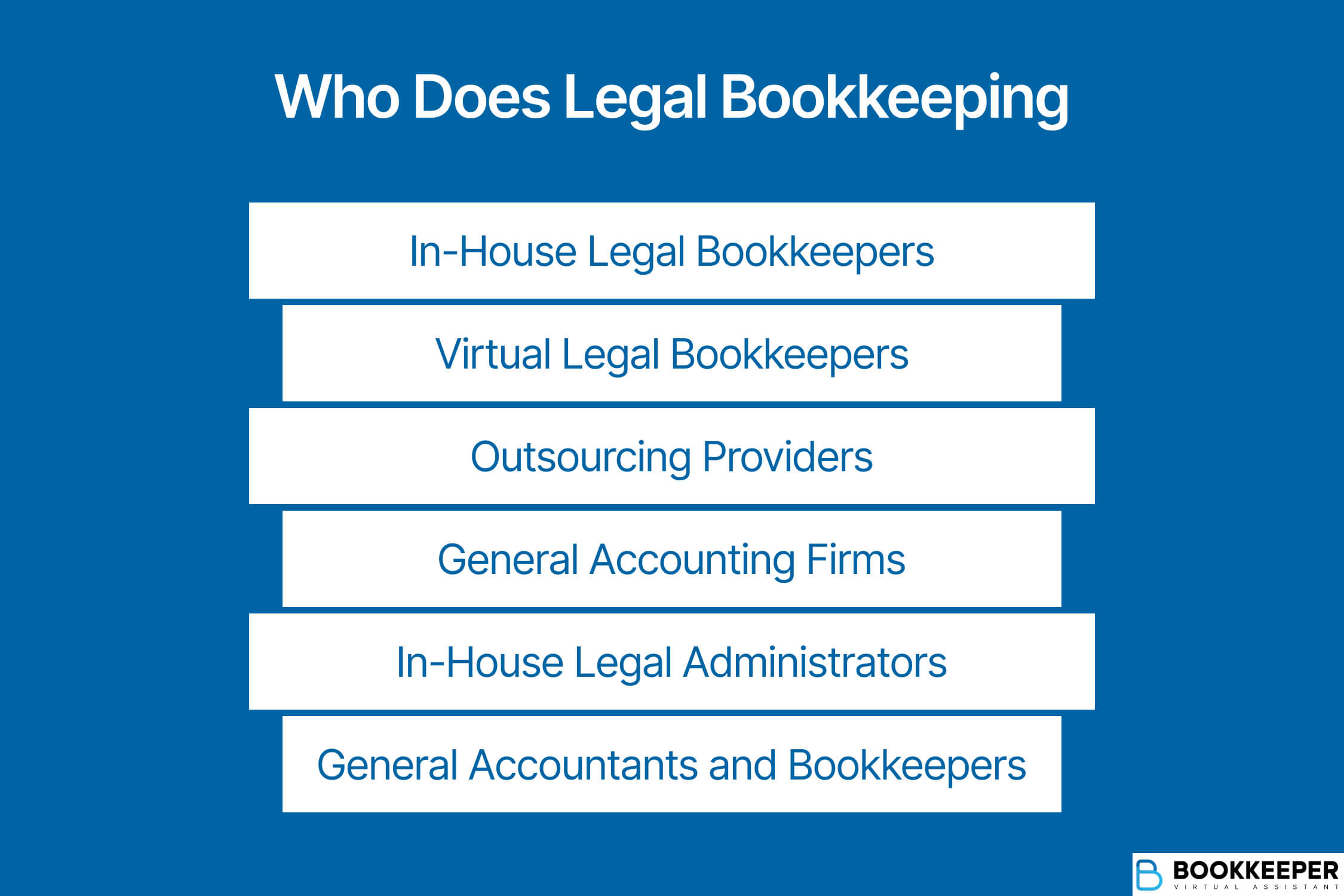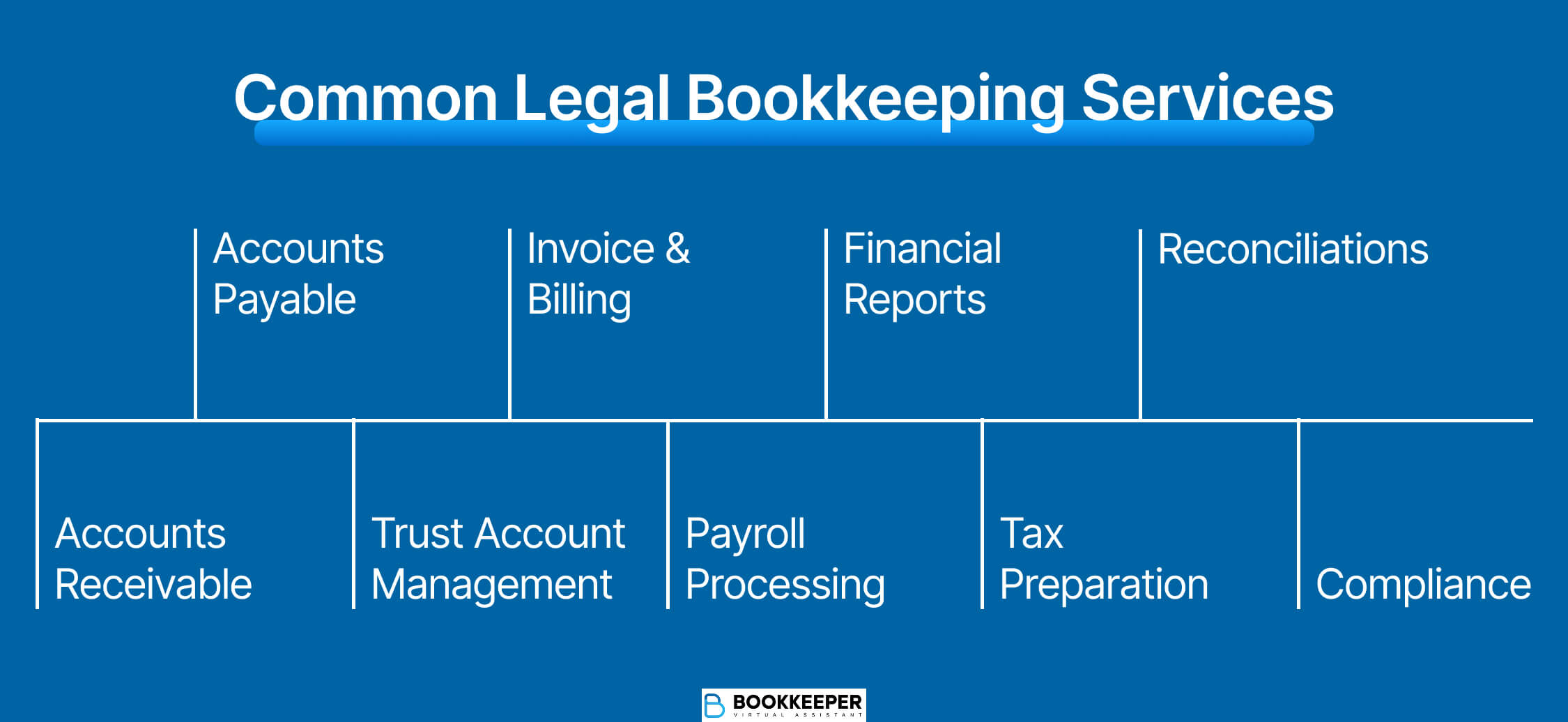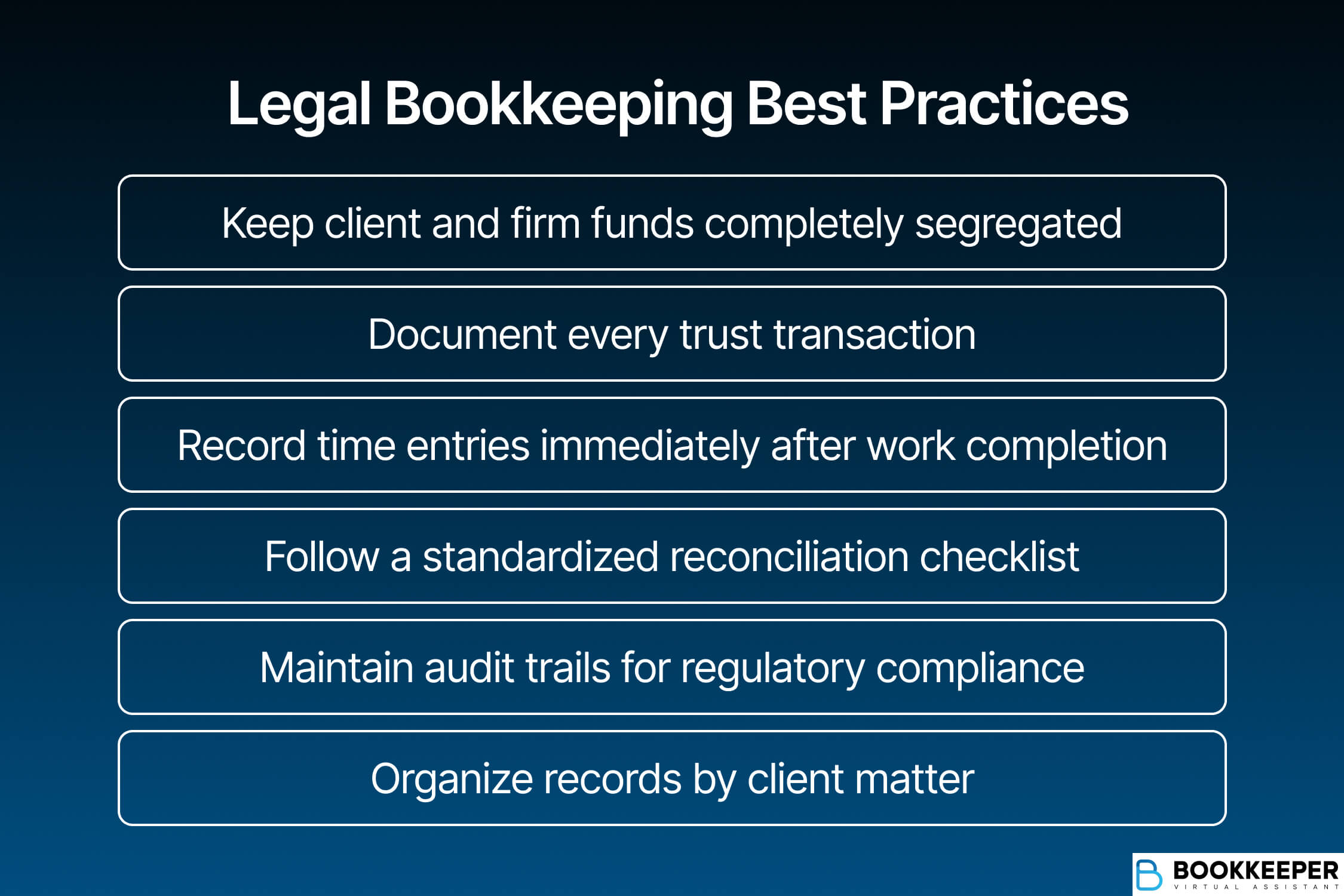Lawyers are ultimately responsible for their firm’s bookkeeping, but that doesn’t mean they should handle it themselves. Legal bookkeeping is complex, and even small mistakes can lead to compliance issues or financial risks that threaten your law practice.
To maintain well-managed finances, many law firms delegate bookkeeping tasks to professionals who specialize in legal accounting and bookkeeping. This not only protects clients and the firm but also frees attorneys to focus on billable work rather than time-consuming administrative tasks.
What is Legal Bookkeeping?
Legal bookkeeping is a specialized form of bookkeeping that focuses on the recording and management of financial transactions for legal practices. It involves tracking client trust funds, billable hours, case expenses, and attorney operating accounts while ensuring compliance with state bar regulations and ethical rules on separating client and firm funds.
Who Provides Legal Bookkeeping Services?

Legal bookkeeping services are typically provided by several types of professionals and service providers:
In-House Legal Bookkeepers
Legal bookkeepers are financial professionals who specialize in managing the finances of law firms. They handle specific tasks like managing trust accounts and IOLTA compliance, processing legal billing, and preparing financial reports that meet legal industry requirements. They can be independent contractors, employees of a law firm, or work for specialized firms.
Virtual Legal Bookkeepers
Virtual legal bookkeepers provide the same specialized services as in-house legal bookkeepers but work remotely using cloud-based software and digital communication. They offer flexible arrangements, including part-time, full-time, or project-based work, and have a deep understanding of legal industry regulations and billing systems. Often, virtual bookkeeping can save overhead costs in comparison to in-house.
Outsourcing Providers
Legal outsourcing providers are companies that specialize in delivering back-office services to law firms. They employ teams of legal bookkeepers and administrators to handle tasks like bookkeeping, trust account management, and payroll. These companies often offer packages and integrate their services with various legal practice management software.
General Accounting Firms
These firms combine general accounting expertise with knowledge of legal industry requirements. They typically offer broader financial services beyond basic bookkeeping, including tax planning, financial analysis, and financial consulting. These firms may serve law firms alongside clients from other industries.
In-House Legal Administrators
In-house legal administrators are employees who work directly for law firms to manage financial and administrative operations. They handle internal bookkeeping and may also oversee other administrative staff. They can be known as legal administrators, office managers, or practice managers.
General Accountants and Bookkeepers
These are financial professionals who serve a variety of industries. They can provide standard bookkeeping services to a law firm, but they may need additional training to handle legal-specific tasks like trust account compliance and state bar regulations. Their effectiveness depends on their willingness to learn and their familiarity with legal software.

Common Legal Bookkeeping Services

Legal bookkeeping services encompass specialized financial management functions designed to meet the unique operational and regulatory requirements of law firms and legal practices.
Accounts Receivable
Managing outstanding client invoices and payment collection represents a critical function for law firm cash flow. Accounts receivable services are responsible for tracking and collecting fees owed to the firm by clients. This includes monitoring outstanding invoices, processing payments, and maintaining records of client payment histories and billing arrangements.
Accounts Payable
Proper oversight of expenses and vendor payments is essential to maintain operations and control cash flow. Accounts payable services handle incoming bills, verify expense accuracy, schedule payments, and keep comprehensive vendor records. This includes managing technology costs, professional services, and other operating expenses while ensuring proper authorization and documentation.
Trust Account Management
Legal bookkeeping requires keeping client funds separate from firm operating capital. Regular three-way reconciliation is often legally required for law firms managing trust accounts to protect both attorneys and clients from potential violations. Failure to maintain proper separation of trust accounts can lead to bar complaints and financial penalties.
Invoice & Billing
Accurate invoicing and billing are central to financial management in law firms. This service involves tracking time entries, generating client invoices, and ensuring charges accurately reflect the work performed. It supports both client transparency and the firm’s accounts receivable, contributing to an optimized financial operation.
Payroll Processing
Law firm compensation often involves complex salary structures, partnership distributions, and bonuses. Payroll processing requires specialized expertise to ensure accuracy and transparency. Well-managed payroll systems help maintain regulatory adherence while supporting employee satisfaction and trust.
Financial Reports
Legal practice financial analysis requires reports that address the unique economics of law firm operations, including matter profitability and attorney productivity. These services prepare profit and loss statements, balance sheets, cash flow reports, and key metrics such as realization rates and collection efficiency. This reporting provides the insight and transparency into a firm's financial position and operations necessary for informed decision-making.
Tax Preparation
For legal practices, tax preparation is a vital component of financial management that extends far beyond simply filing forms. It involves understanding the complex obligations specific to law firms, which can include intricate business returns, employment taxes, and specific partnership or corporate filings depending on the firm's structure.
Reconciliations
Reconciliations are an essential service for balanced and accurate financial management in any law firm. This process involves comparing a firm's internal financial records with external statements from bank accounts and credit cards. The goal of reconciliation is to identify and resolve any discrepancies, from simple data entry errors to potential unauthorized transactions. By performing these regular checks, firms can ensure the accuracy of their financial data, protect against fraud, and maintain compliance.
Compliance
Law firms face strict regulations and ethical obligations that necessitate precision and structure in bookkeeping. Legal industry regulatory adherence requires ongoing monitoring of state bar requirements, ethical rules, and professional responsibility standards. The purpose of bookkeeping compliance is to safeguard client funds and prevent the misuse or commingling of money
Difference Between Legal Bookkeeping and Generic Bookkeeping
Legal bookkeeping is the process of recording and managing financial transactions specifically for law firms. This form of bookkeeping must comply with bar regulations and ethical rules governing the separation of client funds from firm funds.
Generic bookkeeping refers to standard financial recordkeeping for businesses across industries. It follows generally accepted accounting principles (GAAP) and focuses on basic functions.
Trust Account Management vs. Standard Cash Management
- Legal Bookkeeping: Requires strict separation of client funds from firm operating accounts. Must maintain detailed trust account records with regular three-way reconciliations to comply with state bar regulations.
- Generic Bookkeeping: Manages standard business checking and savings accounts without fiduciary obligations. No requirement for separate trust accounts or client fund segregation.
Time-Based Billing vs. Product/Service Billing
- Legal Bookkeeping: Centers on detailed time tracking and billable hour management. It requires systems to capture attorney time, matter codes, and client-specific work as billing rates vary by attorney level and practice area.
- Generic Bookkeeping: Primarily handles fixed-price products or standard service fees. Limited time tracking requirements, typically for employee hours rather than billable client time. Pricing structures are generally more straightforward.
Matter Accounting vs. Project Accounting
- Legal Bookkeeping: Tracks costs and revenues by individual legal matters or cases, requiring detailed expense allocation to specific clients and matters for accurate profitability analysis and client billing.
- Generic Bookkeeping: May track project costs but without the same level of client-specific detail. Project accounting focuses on internal cost control rather than client billing accuracy.
Client Cost Recovery vs. Standard Expense Management
- Legal Bookkeeping: Tracking of reimbursable client costs including court fees, expert witness costs, travel, and administrative charges. Must separate reimbursable from non-reimbursable expenses for accurate client billing.
- Generic Bookkeeping: Standard business expense tracking without the need for detailed client cost allocation. Expenses are typically absorbed as general business costs rather than passed through to customers.
Top Legal Bookkeeping Software and Tools
Freshbooks
FreshBooks is a cloud-based accounting software and invoicing tool designed for ease of use by small businesses. With over 30 million users across 160+ countries, it integrates core accounting with time tracking, invoicing, and project management tools, making it an appealing option for small legal teams.
- Key Strength: Instantly generates professional invoices with automation features such as built-in payment reminders and flexible billing options. It also reconciles trust accounts using advanced three-way matching, which is especially valuable for legal practices.
- Limitations: Charges additional fees for online payment processing, which can have a greater impact on smaller invoices.
Xero
Xero is a cloud-based accounting platform focused on real-time collaboration and automation. Serving over 4 million subscribers globally, it provides streamlined workflows and access to an extensive ecosystem of more than 1,000 integrations, making it a strong option for modern legal practices.
- Key Strength: Allows unlimited users on all plans without extra costs, offers strong bank connectivity with automatic transaction categorization, and supports a large app marketplace with legal-specific add-ons.
- Limitations: Cancelling a subscription requires advance notice, and its mobile app still lacks some features available on desktop.
Clio
Clio is a legal-specific management platform built for law firms, combining case management, time tracking, billing, and accounting functionality in a single integrated system. It is used by over 150,000 legal professionals worldwide.
- Key Strength: Offers an all-in-one platform with real-time dashboards, integration between case management tools, and built-in trust accounting—a major advantage for law firms.
- Limitations: Has a higher cost structure, which may be a significant investment for solo practitioners or small firms with basic accounting needs.
Zoho Books
Zoho Books is part of the Zoho business suite, known for its user-friendly interface and wide range of business applications. It is a good choice for small law firms due to its scalability and integration with other Zoho tools.
- Key Strength: Strong integration with the broader Zoho ecosystem, including CRM and project management. It also reduces manual work with automation for repetitive tasks.
- Limitations: Provides limited advanced reporting compared to specialized accounting software and restricts third-party integrations with other legal tools.
Sage Accounting
Sage Accounting is a cloud-based accounting platform that provides financial management tools suitable for law firms of all sizes.
- Key Strength: Generates advanced financial reports using over 150 templates and automates bank reconciliation and transaction updates.
- Limitations: Offers limited customization for legal-specific billing requirements, requires desktop installation, and its mobile app still lacks many features available on desktop.
Best Practices for Legal Bookkeeping

Effective legal bookkeeping is critical for law firms to remain compliant and financially organized. Below are key practices for stronger financial management:
- Keep client and firm funds completely segregated: Use separate IOLTA accounts for client money and never transfer funds between trust and operating accounts for temporary purposes.
- Document every trust transaction: Record the client name, matter number, transaction purpose, and authorization for each deposit and withdrawal.
- Record time entries immediately after work completion: Capture accurate details while the work is fresh in your memory to prevent underbilling or incomplete records.
- Follow a standardized reconciliation checklist: Use the same systematic approach each month to ensure nothing is overlooked in the process.
- Maintain audit trails for regulatory compliance: Keep detailed transaction histories to demonstrate proper handling of client funds and adherence to bar requirements.
- Organize records by client matter: Structure your filing system to easily locate documents during audits or client inquiries about specific cases.
Benefits of Having a Legal Bookkeeper

There is no doubt that bookkeeping makes financial sense, but why do law firms increasingly rely on legal bookkeepers? Here are the key advantages they provide:
- Regulatory Compliance Protection. Professional legal bookkeepers understand state bar requirements, IOLTA regulations, and trust account rules that protect your law license.
- Enhanced Cash Flow Control. They improve accounts receivable by tracking invoices, managing collections, and maintaining payment histories, which improves collection rates and reduces outstanding balances.
- Time Savings for Attorneys. By handling financial management tasks, legal bookkeepers free attorneys to focus on billable work and client service.
- Cost-Effective Expertise. Hiring a legal bookkeeper often costs less than the potential losses from compliance violations, billing errors, or inefficient financial processes.
- Audit Preparation and Support. They provide organized documentation and detailed records that demonstrate compliance, making bar audits or reviews less stressful and more efficient.
- Accurate Time and Billing Management. They streamline tracking billable hours, managing multiple matter codes, and creating detailed client invoices, which directly impact cash flow and profitability.
Final Note
Legal bookkeeping services have become a necessity for many law firms seeking stronger financial operations. Whether you hire an in-house bookkeeper, work with a virtual professional, or outsource services, choosing the right fit is essential, as they will be responsible for managing your resources and ensuring compliance. With the legal services industry growing at an annual rate of 4.5%, firms that equip themselves with the right team can build a more efficient, compliant, and profitable practice.
Frequently Asked Questions
What legal bookkeeping services are typically used by a small law firm?
Small law firms commonly use services such as trust accounting, accounts receivable/payable management, expense tracking, payroll support, and financial reporting.
Does virtual bookkeeping have the same quality as in-house?
Yes. Virtual bookkeeping can deliver the same accuracy and compliance as in-house support when handled by virtual legal bookkeepers with the right systems and software.
Is legal accounting software used for bookkeeping?
Yes. Legal accounting software is specifically designed for, and widely used in law firm bookkeeping.
Can a legal bookkeeper also handle law firm accounting?
Yes, but with limits. Bookkeepers record financial transactions, while an accountant analyzes and interprets that data. Their roles are distinct but complementary.
What common mistakes should be avoided in legal bookkeeping?
Mixing client and firm funds, improper trust account management, failing to track billable expenses, and inaccurate reconciliations are common mistakes to avoid.
How can law firm bookkeeping impact finances?
Proper bookkeeping strengthens a firm’s finances by improving cash flow, ensuring compliance, and providing accurate financial records.





